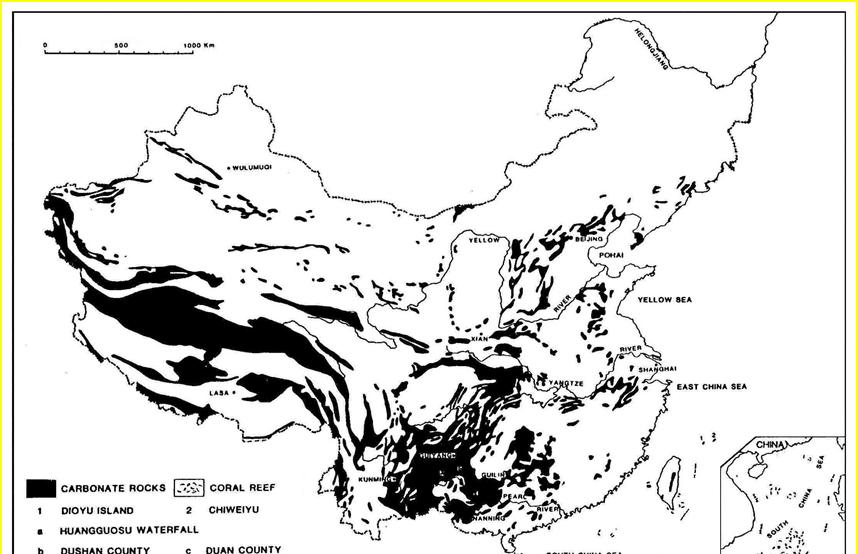Beetle Sea & Soldier Boy
The discovery of the Qihua blind rifle, Sinaphaenops mirabilissimus Uéno & Wang, 1991, ushered in the study of cave armor in China.

Distribution of carbonate rocks in China (after Chen WH, 2011)
01 One of the key words: four categories of significance
Chiva Blind Rifled Sinaphaenops mirabilissimus Uéno & Wang, 1991
Shoudong Blind Foot armor Dongodytes fowleri Deuve, 1993
Giraffaphaenops Clarkei Deuve, 2002
Xuedytes bellus Tian & Huang, 2017
02 Keyword 2: two scholars and a team
Dr. Shunichi Ueno (National Museum of Nature and Science, Tokyo)
He was one of the pioneers in the study of cave rifles in China. In 1991, he jointly discovered and reported the first blind step armor produced in China, the Qihua Blind Step Armor, together with Mr. Wang Fuxing of the China Institute of Karst Geology. In the following ten years, he came to China many times to investigate and collect, covering all provinces and regions of southern China, as well as Jiangxi, Zhejiang and Hubei. It has successively established and described 18 new genera and more than 50 new species of cave step beetles produced in China.
Dr. Thierry Deuve (Rijksmuseum, Paris)
He is a well-known infantry scholar. In 1993, he described the Shoudong blind rifle armor produced in Bama, Guangxi. It has successively established and described 15 new genera and 54 new species of cave step beetles produced in China.
Spele biology research team of South China Agricultural University
In 1999, our team collaborated with Dr. Thierry Deuve to publish the first cave step nail paper. Since 2011, the team has independently carried out research on the classification of cave step armor. So far, nearly 800 caves have been inspected across the country. 33 new genera (subgenera) and 111 new species of Cave Manoe in China have been established and described successively. Of these, 10 new genera and 28 new species were published in collaboration with Dr. Thierry Deuve.
03 The first decade (1991-2000):
Cathaiaphaenops Deuve, 1999
Cimmeritodes Deuve, 1996
Dongodytes Deuve, 1993
Guizhaphaenops Vigna Taglianti, 1996
Junaphaenops Ueno, 1997
Libotrechus Ueno, 1998
Minimaphaenops Deuve, 1999
Oodinotrechus Ueno, 1998
Qianaphaenops Ueno, 2000
Qianotrechus Ueno, 2000
Shenaphaenops Ueno, 1999
Sinaphaenops Ueno & Wang
Sinotroglodytes Deuve, 1996
Toshiaphaenops Ueno, 1999
Uenotrechus Deuve & Tian, 1999
04 Second Decade (2001-2010):
Bathytrechus Ueno, 2005
Boreaphaenops Ueno, 2002
Guiaphaenops Deuve, 2002
Jiangxiaphaenops Ueno et Clarke 2007
Microblemus Ueno, 2007
Pilosaphaenops Deuve & Tian, 2008
Satotrechus Ueno, 2006
Shilinotrechus Ueno, 2003
Sichuanotrechus Deuve: 2005
Wulongoblemus Ueno, 2007
Yanzaphaenops Ueno, 2005
05 Third Decade (2011-2020):
Casaleaphaenops Tian et al., 2021
Chakus Tian & Huang, 2021
Chu Tian & He, 2020
Deuveaphaenops Tian & Huang, 2017
Dianotrechus Tian, 2016
Dongoblemus Deuve and Tian, 2016
Duvalioblemus (Shublemus) Deuve et al., 2020
Graciliblemus Deuve and Tian, 2016
Huoyanodytes Tian and Huang, 2016
Guizhaphaenopoides Tian & Huang, 2021
Jiulongotrechus Tian, Huang & Wang, 2015
Luoxiaotrechus Tian & Yin, 2013
Miaotrechus Tian, Chen & Ma, 2020
Minimaphaenops (Enshiaphaenops) Deuve, 2016
Oodinotrechus (Pingleotrechus) Sun et Tian, 2015
Panaphaenops Tian et al., 2021
Plesioaphaenops Deuve & Tian, 2011
Qianaphaenops (Sanwangius) Tian & Chen, 2019
Shenoblemus Tian and Fang, 2020
Shiqianaphaenops Tian, 2016
Shuangheaphaenops Tian, 2017
Sidublemus Tian & Yin, 2013
Tianeotrechus Tian & Tang, 2016
Tianzhuaphaenops Zhao & Tian, 2016
Tokinaphaenops Huang and Tian, 2019
Wanhuaphaenops Tian & Wang, 2016
Wanoblemus Tian and Fang, 2016
Xiangius Tian & Huang, 2021
Xuedytes Tian and Huang, 2017
Yunotrechus Tian & Huang, 2015
Zhijinaphaenops Ueno et Ran, 2002
Troglopatrobus Deuve, He et Tian, 2020
Pterostichus (Huaius) Tian &Ding, 2019
Guiodytes Tian, 2014
06 Composition of the Chinese cave step armor fauna
Engraved scabbard A family Ozaenini: 1 genus / 1 species
Patrobini: 1 genus/1 species
Clevinini: 1 genus/5 species
Bembidiini: 1 genus/1 species
Small-step Tachyini: 1 genus/4 species
Trechini: 57 genera /180 species
Platynini: 2 genera/8 species
Pterostichini: 3 genera, 8 species
An overview of the distribution of cavemen in China
07 Characteristics of the Chinese cave step fauna
(1) Rich variety;
(2) The origin of the fauna is complex and the differentiation is strong;
(3) Most of them are distributed in the karst areas of southern China;
(4) Morphological diversity, with many of the world's most morphologically specialized taxa and species;
(5) The distribution range of species is very narrow, and they are all unique to China.
Acknowledgements: Thank you to your colleagues, friends and colleagues who have supported our research in various ways, and thank you to all of your collaborators for their selfless contributions!